As global population ages and dementia rates climb, scientists may have found an unexpected ally in the fight against cognitive decline.
Cats and dogs may be exercising more than just your patience: they could be keeping parts of your brain ticking over too. In a potential breakthrough for preventive health, researchers have found that owning a four-pawed friend is linked to slower cognitive decline by potentially preserving specific brain functions as we grow older.
Interestingly, the associations differ depending on the animal: dog owners were found to retain sharper memory, both immediate and delayed, while cat owners showed slower decline in verbal fluency.
When it comes to slower cognitive decline in their owners, however, it seems that not all pets are created equal: fish and birds, while charming companions, showed no significant link.
“Pet ownership has been linked to a positive influence on cognitive functioning and cognitive decline in late adulthood,” said Adriana Rostekova, a researcher and lead author of the article, which was published in Nature. “However, there is limited understanding of how different species of pets are associated with these outcomes.”
Rostekova, who works at the lifespan developmental psychology research group at the University of Geneva, used data from eight waves of the Survey of Health and Retirement in Europe to examine the relationship between pet ownership and cognitive decline over an 18-year period among adults aged 50 and older.
She specifically looked at the distinct role of owning dogs, cats, birds and fish. “The key novelty of our study was that we found notable differences between the species,” she said.
Rostekova hypothesised that because keeping fish or birds showed no meaningful link to changes in cognitive decline, the overall pattern of pet ownership may be driven primarily by having a cat or dog rather than pet ownership in general.
“Several explanations may help explain the absence of this association in fish and bird owners, despite the reports of their ownership’ positive influence on wellbeing in ways that are usually associated with cognitive benefits,” she added.
“A fish or bird’s short lifespan may potentially limit the level of emotional connection one is able to develop with the pet fish,” she said. “Bird ownership may negatively affect the owner’s sleep quality due to the increased noise levels, which has been shown to be associated with cognitive decline.”
Rostekova added: “[It is] further possible that interaction with dogs and cats provides unique cognitive stimulation, which may be less pronounced in other, less demanding pets.”
Other research has found evidence of an increase in prefrontal brain activation and stronger attentional processes and emotional arousal caused by interaction with a dog.
There is further evidence of increased activation of the prefrontal cortex and the inferior frontal gyrus when interacting with cats, which is speculated to be linked to the characteristic, hard-to-predict temperament of the animal.
“There is also a possibility of increased social stimulation facilitated by cats and dogs, which may be linked to the slower cognitive decline experienced by their owners: an increased frequency of social interactions when accompanied by a dog – or for cats, a substitute for a social network,” said Rostekova.
As the NHS grapples with an ageing population and rising dementia rates, experts say the findings could reshape how we think about healthy ageing – and the animals we choose to age alongside.
Andrew Scott, the author of The Longevity Imperative and a cat owner (although also a dog lover), said: “We tend to think of health as being about disease and hospitals but as we live longer and need to focus on preventive measures that keep us healthy for longer, we will discover that the health system extends well beyond doctors and hospitals.
“It is about how we live our life. What is nice about this study is it suggests a fun and meaningful way of keeping healthy and engaged. A lot of things we are recommended to do for our health aren’t always fun or companionable (does anyone fast as a family?). Having a pet can be fun and if it keeps you healthy that’s a great bonus.”


